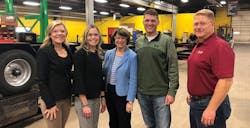There is no place like home.
“The Wonderful Wizard of Oz” author L. Frank Baum recognized this truth more than 100 years ago, as do the Felling Trailers employees who’ve recently left the company to work closer to home.
To offset the attrition, Felling is finding ways to foster homegrown talent.
Like many other manufacturers, the custom trailer builder, which has 275 employees at its Sauk Centre and Litchfield facilities in Minnesota but needs “20 to 30” more, is building relationships with area high schools and colleges in hopes of developing the next generation of workers in its own backyard.
“By partnering with educators, we can introduce modern manufacturing to students and expose them to the career opportunities that exist,” co-owner Brenda Jennissen said.
“We are a growing company and need a strong workforce to keep pace with the demand for our product.”
Felling’s efforts haven’t gone unnoticed.
Minnesota Senator Amy Klobuchar toured Felling’s Litchfield production plant in late October during her road trip to visit manufacturers in Central Minnesota, speaking with company ownership and management about issues such as health care and the workforce shortages that threaten their future.
She, too, wants to see schools help address an alarming lack of exposure to careers in manufacturing.
“The federal government only has about 10% of education funding, but sometimes it can be used not as a hammer, but a carrot, to say ‘OK, if you do these kinds of programs in your schools, then you are going to get a grant or something.’” Klobuchar said. “And I think we should be doing more of that, specifically focused on schools that are doing more with offering technical education, making it easier for schools to pair up with community colleges.”
Felling invites schools to take students to their facilities to help them develop a better understanding of what a career in manufacturing entails. The tours detail the entire trailer building process from start to finish. Most recently, Sauk Centre seventh-grade students toured their facility.
“They were amazed,” Jennissen said. “They had no idea what was going on in their own backyard.”
Along with hosting tours, Felling offers student programs, including Careers in the Community, which provides weld training to high school juniors and seniors, Youth Welding Camp, which supplies basic skills and safety for elementary and junior high kids, and, most recently, a Women in Welding course—all free of charge.
Felling said many of those students have gone on to work part-time for the company while in high school and college, bolstering their experience in manufacturing at a facility that’s close to home.
Klobuchar’s hoping to assist their efforts, and the efforts of other Minnesota manufacturers, by taking measures at the federal level to strengthen local workforces, including the introduction of the Perkins Bill.
“It will put more money into apprenticeships and community college,” she said.
“(It’s important) to start saying very clearly as leaders on the federal level, in both parties, there are many paths to success. You don’t need a four-year degree right away. My own sister didn’t graduate from high school, and she went on and worked in manufacturing in Iowa, and she eventually got her GED. And then she got a two-year degree and eventually (a) four-year degree, and she’s an accountant now. I think that whole work experience was very good for her for many reasons.
“We have to be very clear. It’s not one size fits all. You can get a college degree while you are working, and you can certainly work on stuff while you’re in high school. I think parents have to see the value of these jobs, how much they pay, the advantages of them. And employers are looking at, ‘OK, what can I do to be flexible with schedules? What can I do to get more women in the workforce in manufacturing?’
“It’s no longer the three Ds—dark, dirty and dangerous. It’s pretty light in (Felling’s facility).”
